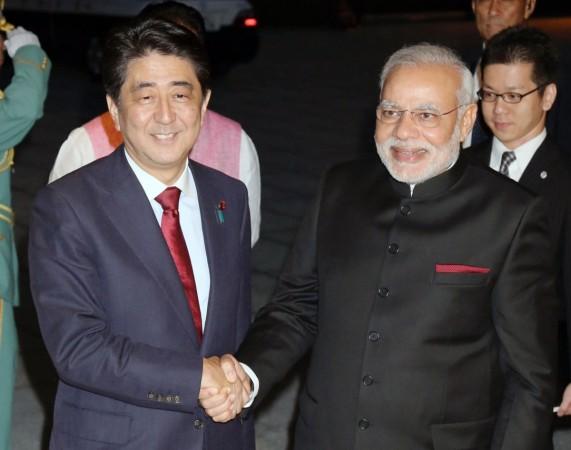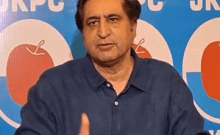
Bilateral talks between Prime Minister Narendra Modi and his Japanense counterpart Shinzo Abe took off on a grand note on Monday as the Indian Prime Minister received a ceremonial guard of honour at the Akasaka Palace in Tokyo, on his third day in Japan.
Modi is in Japan on a five-day trip to sign important deals in infrastructure, civil nuclear agreements and defence cooperation.
$33 billion Investment: Ministry of External Affairs spokesperson Syed Akbaruddin announced through Twitter that that the two leaders have agreed to 'elevate the relations to the next level' and that Japan has announced a major investment of ¥3.5 trillion in India in the next five years.
"¥3.5 trillion of public & private investment from Japan to India in 5 year period under India–Japan Investment Promotion Partnership," Akbaruddin tweeted.
The investment, that amounts to more than $33 billion, will be directed primarily at finance, infrastructure projects and building of smart cities.
Tokyo Declaration: India and Japan also signed the Tokyo Declaration for a global partnership. The two sides also discussed reforms in the United Nations Security Council.
Support for Bullet Trains: Japan has offered financial and technical support to India to develop bullet trains in the country on the lines of the Japanese network of high-speed railway lines known as 'Shinkansen'.
"Japan offers to provide India financial, technical and operational support to introduce Shinkansen system," Akbaruddin tweeted.
Japan to remove six of India's space and defence-related entities from Japan's Foreign End-User List.
— Syed Akbaruddin (@MEAIndia) September 1, 2014
No N-Deal Breakthrough: However, a breakthrough in the civil nuclear deal that India has been vying did not take place, given that Japan wants assurances of stringent checks on use of nuclear energy. There was just a statement of intent to carry the talks forward, reporst suggested.
"We have discussed the Civil Nuclear Agreement. We have instructed officials to work on this pact so that our strategic partnership is strengthened. Japan has also decided to remove restrictions on some Indian companies. This proves that our relations have reached a new level," Modi said at the joint press meet.
Defence and security cooperation: The two leaders achieved comprehensive agreements on defence and security co-operation, including that for the delivery of amphibious vehicles and greater co-ordination on maritime security.
"The two nations will work together on non-proliferation, cyber security, space security as well as in regional forums," Modi said.
Other issues: Women's Empowerment, Clean Ganga Project, Student Exchange
Modi said, India and Japan also signed other significant agreements – on roads, clean energy, women's empowerment and the Kyoto-Varanasi agreement.
He said that Abe has assured India of assistance in the project to clean up River Ganga.
According to Akbaruddin, the topics discussed at the meeting included investment promotion partnership, student exchange between the two nations, and women's empowerment.
India-Japan to substantially increase the number of exchange students between as well as to enhance Japanese language education in India.
— Syed Akbaruddin (@MEAIndia) September 1, 2014
You can follow the major Indo-Japan announcements Live here -
Prime Minister #NarendraModi's Japan visit: Signing of Agreements and joint press remarks. Live from Tokyo, Japan http://t.co/cMpGitonON
— Doordarshan News (@DDNewsLive) September 1, 2014

















